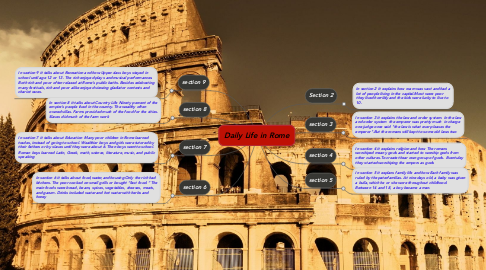Daily Life in Rome
by ben talley

1. section 6
1.1. In section 6 it talks about food,water,and housing Only the rich had kitchens. The poor cooked on small grills or bought “fast food.” The main foods were bread, beans, spices, vegetables, cheeses, meats, and garum. Drinks included water and hot water with herbs and honey
2. section 7
2.1. In section 7 it talks about Education Many poor children in Rome learned trades, instead of going to school. Wealthier boys and girls were tutored by their fathers or by slaves until they were about 6. Then boys went to school. Roman boys learned Latin, Greek, math, science, literature, music, and public speaking
3. section 8
3.1. In section 8 it talks about Country Life Ninety percent of the empire’s people lived in the country. The wealthy often owned villas. Farms provided much of the food for the cities. Slaves did much of the farm work
4. section 9
4.1. In section 9 it talks about Recreation and how Upper-class boys stayed in school until age 12 or 13. The rich enjoyed plays and musical performances. Both rich and poor often relaxed at Rome’s public baths. Besides celebrating many festivals, rich and poor alike enjoyed viewing gladiator contests and chariot races.
5. Section 2
5.1. In section 2 It explains how roam was vast and had a lot of people living in the capital.Most were poor they lived horribly and the kids were lucky to live to 10.
6. section 3
6.1. In section 3 it explains the law and order system. In the law and order system the emperor was pretty much in charge one judge once said "the law is what ever pleases the emperor".But the romans still kept to some old laws two
7. section 4
7.1. In section 4 it explains religion and how The romans worshiped meany gods and started to worship gods from other cultures.To create thear own group of gods. Eventuley they started worshiping the empors as gods
8. section 5
8.1. In section 5 it explans family life and how Each family was ruled by the paterfamilias. At nine days old, a baby was given a bulla, which he or she wore throughout childhood. Between 14 and 18, a boy became a man.


